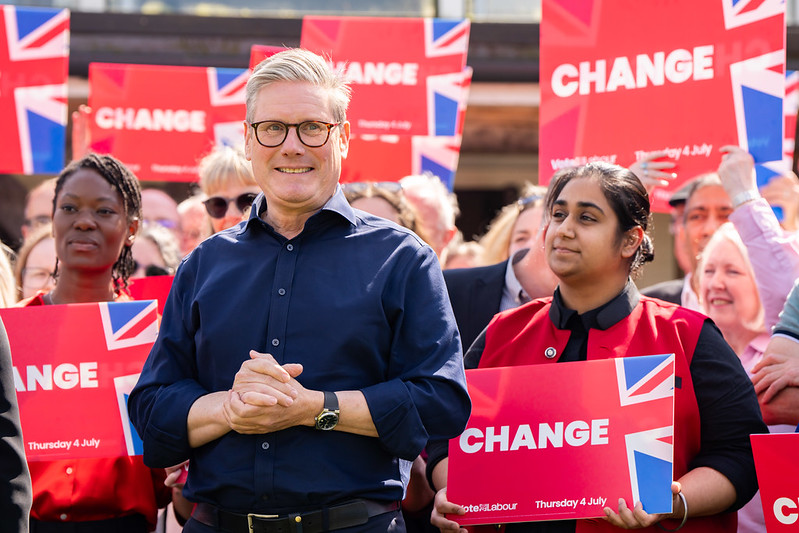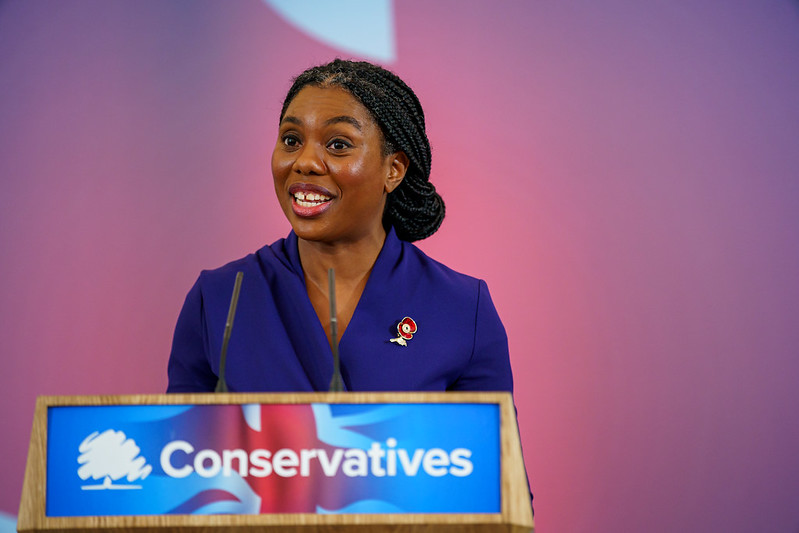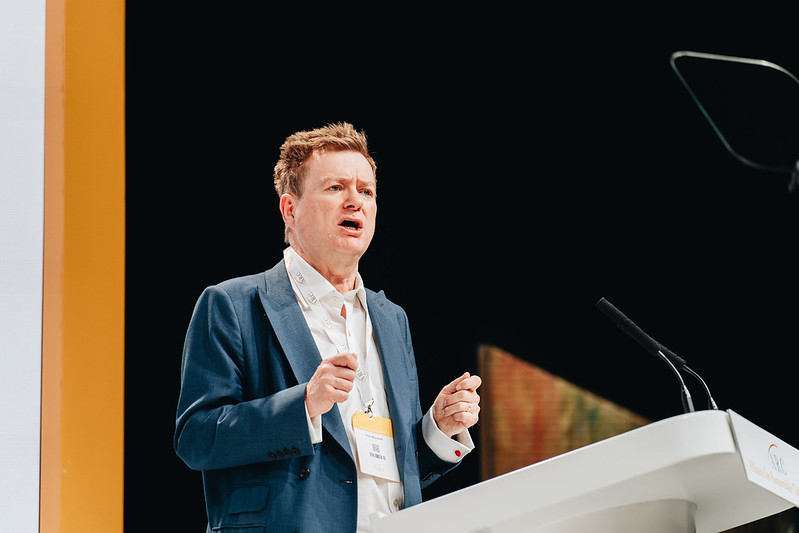The July 2024 general election saw a major shift in the UK’s approach to tackling climate change. The incoming Labour government made ambitious pledges to cut emissions and switch to green energy, with a target of “clean power” by 2030 and support for on and offshore wind.
These moves have been welcomed by the Climate Change Committee (CCC), the government’s independent advisory body, which has said cutting emissions to net zero by 2050 is possible and “beneficial to our economy” if the right steps are taken now.
But the last 12 months have also seen a renewed backlash against climate action — with major political challenges that could threaten the UK’s targets.
Under its new leader Kemi Badenoch, the Conservative Party has formally abandoned the net zero targets passed into law, destroying the cross-party consensus on climate action and making climate a core issue in any future election.
Nigel Farage’s climate denialist Reform UK party — which is ahead of Labour in some opinion polls — has used its local election wins to scrap council climate policies, and say sit would do the same nationally if it ever forms a government.
The second Donald Trump presidency in the U.S. has bolstered the efforts of climate denial think tanks to import his pro-fossil fuel agenda to the UK. In the media, influential conservative outlets The Spectator and The Telegraph have been bought by owners with millions invested in fossil fuels.
Meanwhile, the Labour government’s warm relations with the oil and gas industry threaten its green ambitions, by diverting valuable resources to controversial false solutions such as carbon capture and storage (CCS) technology instead of renewables.
This all comes as a prolonged heatwave grips Europe, with the UK recording its hottest June on record, powered by human-made climate change.
One year on from the 2024 general election, here are five big threats to climate action in the UK.

1. Labour Pains: Corporate Capture?
Keir Starmer’s Labour government has kept its pledge not to approve new exploration licences for North Sea oil and gas. It has lifted the ban on onshore wind farms and invested billions in offshore wind, solar farms, and nuclear energy, and set a goal of “clean power” (a 95 percent renewable electricity grid) by 2030. This week it announced a plan to nearly double onshore wind by 2030.
Labour’s clean energy push comes in stark contrast to the previous Conservative government, which approved around 100 new oil and gas licences and delayed several key net zero targets.
For its efforts, the Labour government has been denounced by the right, with a mountain of Telegraph op-eds attacking its green agenda and net zero secretary Ed Miliband.
At the same time, Labour’s warm relationship with the oil and gas industry threatens to sink its green agenda by wasting resources which could be better spent on renewable power.
As DeSmog revealed in June, Chancellor Rachel Reeves privately reassured Norwegian oil company Equinor that the three percent rise in the windfall tax on oil and gas profits was a “quid pro quo”. In a meeting last August, Reeves said the funds raised “enable government investment” in Carbon Capture, Utilization and Storage (CCUS). It has since announced £22 billion in CCUS subsidies.
CCUS and CCS technology has long been criticised as a false solution to the climate crisis. In January, Equinor was forced to retract the claim that its flagship carbon capture project in the North Sea stored a million tonnes of CO2 a year — a figure that was off by a factor of ten.
As DeSmog has reported, Labour has other ties to the fossil fuel industry, from sponsored events at its party conference, to “partnership”at the UK’s pavillion at the COP29 climate summit in Azerbaijan, to Labour donors and the public affairs firm headed by U.S. ambassador Peter Mandelson lobbying for oil and gas clients.
As Tessa Khan, executive director of the campaign group Uplift, recently told DeSmog: “Oil companies like Equinor have held sway over successive UK governments, for years shaping policies to benefit their bottom line and slowing down climate action.
“This Labour government must stand up to them and put our needs – for affordable clean energy and a safe climate that we can pass on to our children – ahead of their insatiable need to profit.”

2. Kemi Badenoch’s Conservative Party Turns on Net Zero
The 2024 election saw the Tories’ anti-green caucus wrecked, with two thirds of MPs who supported the Net Zero Scrutiny Group losing their seats.
Yet the new Conservative leader has abandoned her party’s previous support for net zero, wrecking the consensus on climate action in UK politics.
In March, Kemi Badenoch (who was elected Tory leader in November) declared that the UK’s 2050 net zero target — which the party made legally binding in 2019 — was “impossible” and that the Tories under her leadership no longer supported it. This was despite Badenoch having championed it while she was a minister.
The claim is also contradicted by the Climate Change Committee, which last month said net zero by 2050 is not only possible but also beneficial to the UK economy.
Badenoch’s leadership campaign received money and office space from Neil Record, chair of Net Zero Watch, the campaign arm of the Global Warming Policy Foundation (GWPF), the UK’s main climate science denial group. She also received £10,000 from a Tory peer who sat on the board of U.S. oil giant Chevron.
Badenoch’s chief of policy had also publicly criticised the UK’s net zero target.
Badenoch’s speech was delivered at the headquarters of advertising agency Havas, which has a big contract with Shell. It followed a policy retreat at Neil Record’s Gloucestershire estate.
The Tories’ new anti-climate position was reflected in its party donations. In the first quarter of 2025, the Conservative Party received nearly £250,000 from oil investors and climate deniers. This includes a further £50,000 from Neil Record, £117,600 from oil and gas executive Alasdair Locke, and £75,000 from Tory peer Michael Spencer who has at least £100,000 invested in oil and gas companies.
Badenoch’s ministers and parliamentarians have also used their position to boost a pro-fossil fuel agenda. Shadow energy secretary Claire Coutinho publicly suggested government policy should be vetted by Net Zero Watch director Andrew Montford. Lord Offord, another shadow energy minister, helped launch a report about the supposed cost of net zero written by Kathryn Porter, an energy consultant who has written for the GWPF. Meanwhile, Tory peer Craig Mackinlay, who founded the Net Zero Scrutiny Group, was appointed the new director of the GWPF.
“The Conservatives have become unserious on climate policy under Kemi Badenoch’s leadership, abandoning the commitment to any target for stopping climate change,” said Bob Ward, policy and communications director at the Grantham Research Institute on Climate Change and the Environment at the London School of Economics.

3. Rise of Anti-Climate Reform UK
Nigel Farage’s right-wing populist party Reform UK wants to “scrap net zero”, increase fossil fuel extraction (including coal), and end subsidies for renewable energy. In the general election Reform won five seats in parliament, and in May’s local elections, it took control of ten local authorities and two mayoralties.
The rise of a party openly hostile to the idea of man-made climate change threatens public support for decarbonisation and would be disastrous if Reform ever gets to implement its manifesto.
Reform has used its Westminster platform to spread climate science denial and attack climate action in the public realm.. Over the winter, Reform helped inject climate denial and conspiracy theories into the farmers’ protests against inheritance taxes, claiming the government had a “sinister agenda” to give farmland to immigrants.
At the local level, Reform has started to crack down on climate policies at the council’s it now controls. The party has claimed to be setting up “a DOGE for every council”, inspired by Elon Musk’s chaotic Department of Government Efficiency in the U.S.
Reform’s DOGE initiative is headed by Zia Yusuf, a tech businessman and Musk-wannabe who has called North Sea oil and gas “a gift from god” and said net zero is “religious madness” and a “catastrophic act of self-harm”.
In their first month in power, Reform councils scrapped the flooding committee in Lincolnshire, which has seen hundreds of homes destroyed by storms in recent years, and claimed to have banned Low Traffic Neighborhoods (LTNs), despite there not being any in the areas they govern.
Reform has also built ties with climate deniers abroad, with Farage becoming chair of the U.S. Exxon-funded Heartland Institute’s new UK and Europe branch in January. Last month, Farage was the star speaker at a Heartland event titled ‘Net Zero: The New Brexit?’ held at 55 Tufton Street, the home of the Global Warming Policy Foundation, alongside GWPF advisor Gwythian Prins.
The local elections handed the Greater Lincolnshire mayoralty to Reform’s Andrea Jenkyns, a former Tory minister who was a director of the GWPF until she stepped down in May.
Bob Ward, from the LSE’s Grantham Institute, added: “[Tory leader Kemi] Badenoch has apparently been bounced into her unscientific and unsustainable position by Reform UK’s daft decision to align itself with Donald Trump on climate change, by pretending it does not exist.
“Politicians who cannot accept reality cannot be relied upon to come up with real solutions to the challenges the country faces.”
Reform previously told DeSmog: “We are proud that we are the only party that are climate science realists, realising you can not stop the power of the sun, volcanoes or sea level oscillation.”

4. Fossil Fuel Investors Buy Right-Wing Media
The Conservative press in the UK has been increasingly hostile to climate action, with a record number of attacks on Labour’s green agenda in 2024, according to analysis by Carbon Brief.
A DeSmog investigations found that 94 percent of Telegraph op-eds about green issues in Labour’s first 100 days in office attacked climate science, policy, technology, or activists. This was equal to an average of five attacks per day.
The purchase of two influential media outlets by investors with financial interests in fossil fuels threatens to further radicalise UK conservatives and turn public opinion against climate action.
In September the Spectator magazine (which has also published op-eds hostile to climate action) was bought by Paul Marshall, the multi-millionaire who co-owns GB News. As DeSmog has reported, Marshall’s hedge fund Marshall Wace had £1.8 billion invested in fossil fuels as of June 2023. One of Marshall Wace’s biggest investors, U.S. private equity giant KKR, has a huge fossil fuel portfolio of its own.
In May, Marshall called for the BBC to be “broken up” and its fact-checking service to be “shut down”.
GB News frequently attacks climate action. DeSmog analysis published in April found the broadcaster had aired nearly 1,000 attacks on climate policies around the time of the general election.
In May of 2025, U.S. investment fund RedBird Capital bought the Telegraph in May after a long bidding war. As DeSmog reported in November, RedBird holds investments in at least six fossil fuel firms. The deal also hands a minority stake to International Media Investments (IMI), a fund controlled by the deputy prime minister of the UAE, which is a major producer of oil and gas. Richard Wilson, director of the Stop Funding Heat campaign group, said: “Britain urgently needs a media that tells the truth about climate change, rather than acting as a megaphone for fossil fuel investors.”

5. Donald Trump’s Influence on the UK Right
The return of Donald Trump to the White House on a promise to “drill, baby, drill” for fossil fuels has boosted climate deniers around the world, including right-wing think tanks looking to import Trump’s politics to the UK.
Soon after the election in November, Tory leader Kemi Badenoch flew to Washington to meet vice president elect JD Vance and other figures close to Trump who have a history of attacking climate action.
Reform leader Nigel Farage has made a number of trips to the U.S. since the election, including for Trump’s inauguration in January and to speak at the Exxon-funded Heartland Institute. As mentioned above, he also helped launch the UK and Europe branch of the Institute as its chair.
In February, Trump allies beamed in for speeches at the Alliance for Responsible Citizenship (ARC) conference in London, a right-wing group funded by Paul Marshall and led by Canadian activist Jordan Peterson. As DeSmog revealed, the ARC event was attended by oil and gas executives from BP, Koch Inc., Valero Energy, and Energy Transfer.
Speakers included Trump’s energy secretary Chris Wright, who has headed up oil and gas companies, and used the event to call for more fossil fuel extraction and claim net zero was “a sinister goal” that would “impoverish” people.
The ARC event also featured talks by Tory leader Kemi Badenoch and Reform leader Nigel Farage. The latter, in an interview with Peterson at the event, said: ““I’m not a scientist. I can’t tell you whether CO2 is leading to warming or not, but there are so many other massive factors.”
At least two of Badenoch’s shadow secretaries of state — Priti Patel and Robert Jenrick — have spoken at the Heritage Foundation, the U.S. conservative think tank behind Project 2025, widely considered the blueprint for Trump’s second term.
In October, Tory peer David Frost, then a director of the GWPF, spoke at a Heritage Foundation event in Hungary alongside members of Viktor Orban’s government, which has also tried to influence climate policy in the EU.
The post Climate Progress and Pushback: 365 Days Under Labour appeared first on DeSmog.
This post has been syndicated from DeSmog, where it was published under this address.
